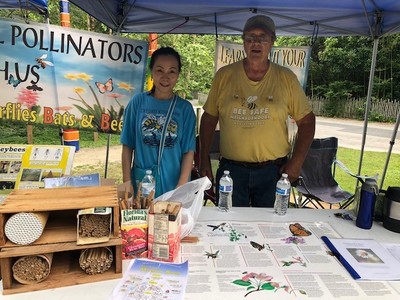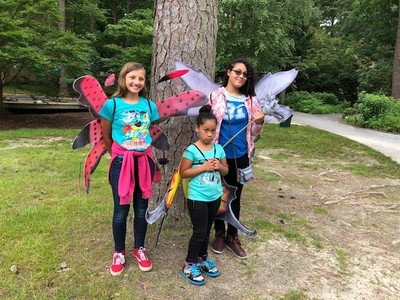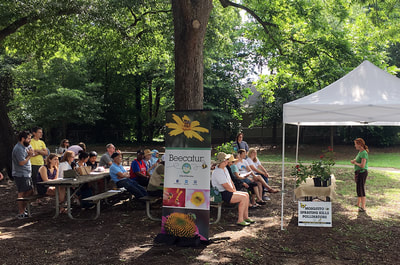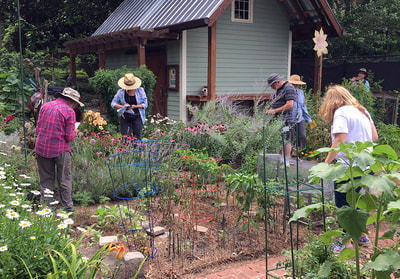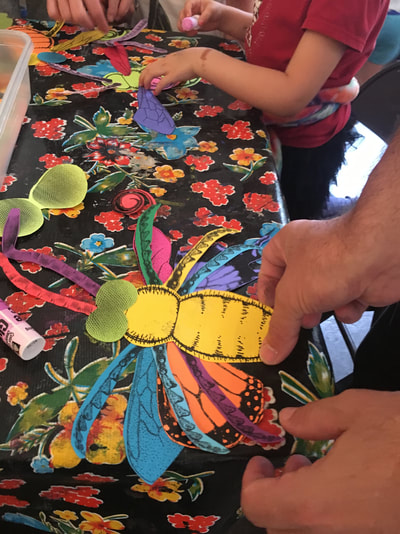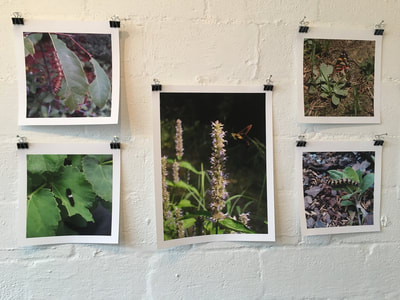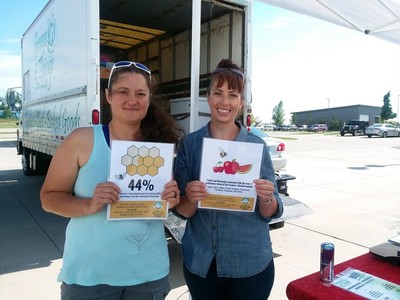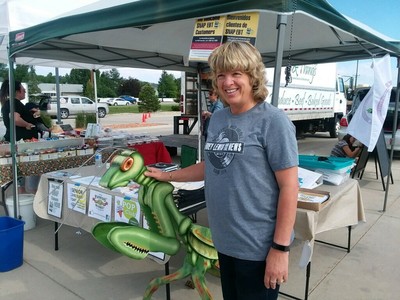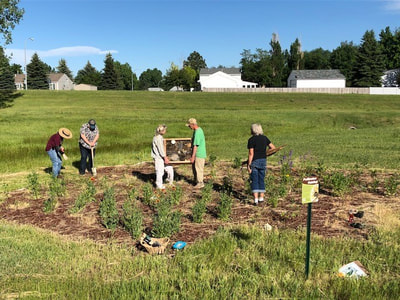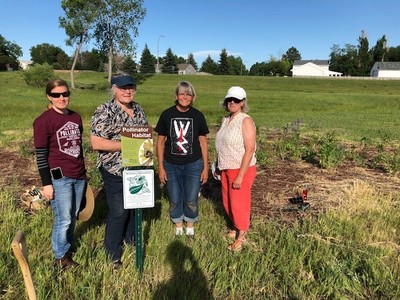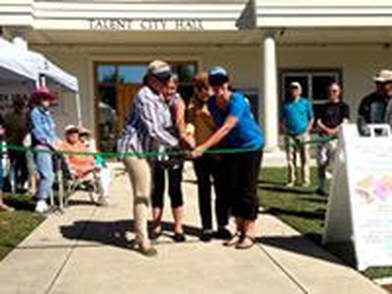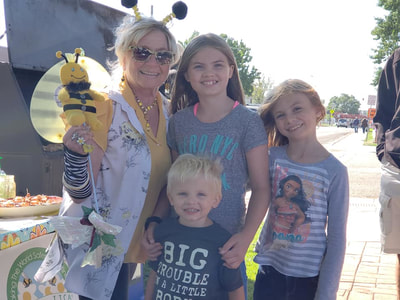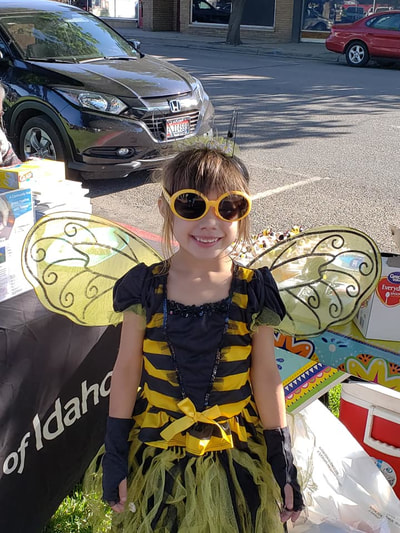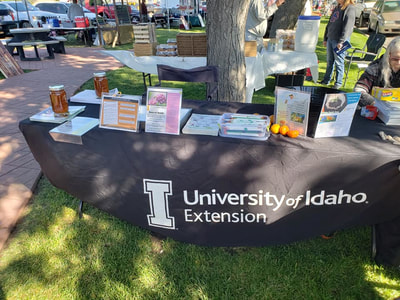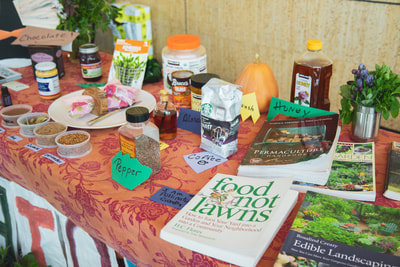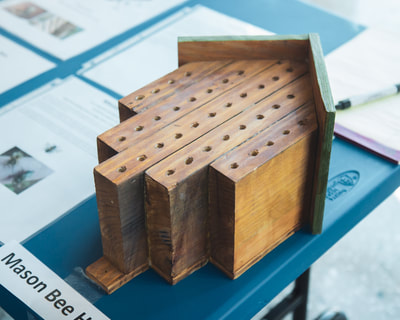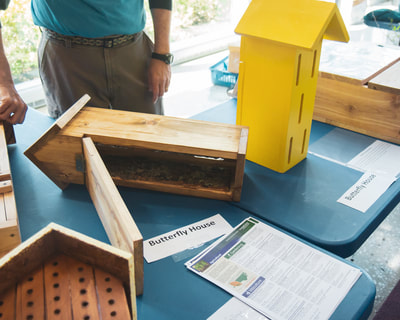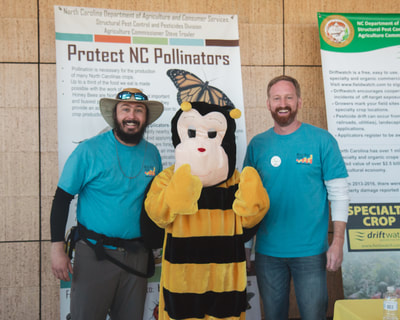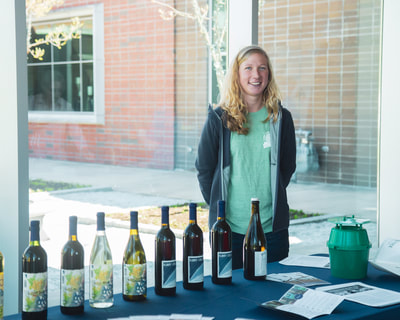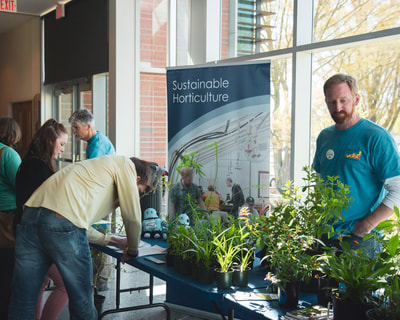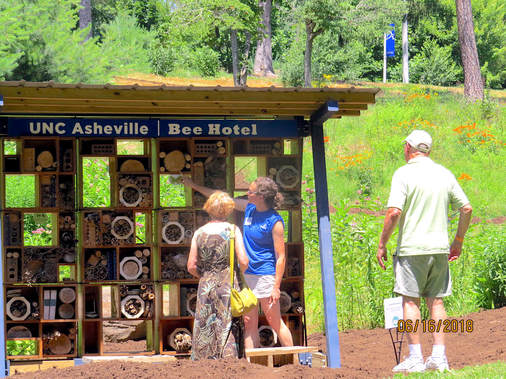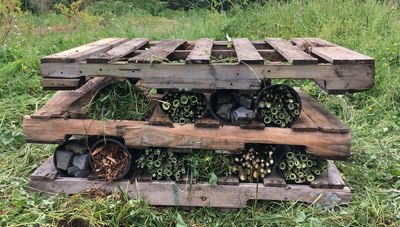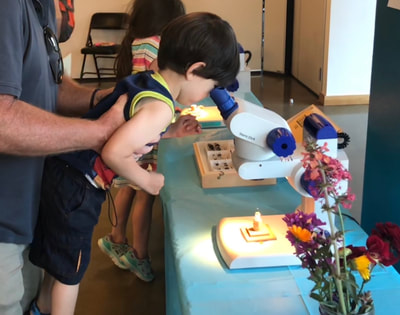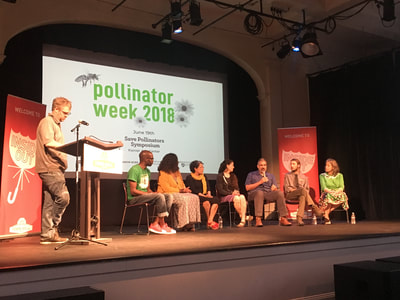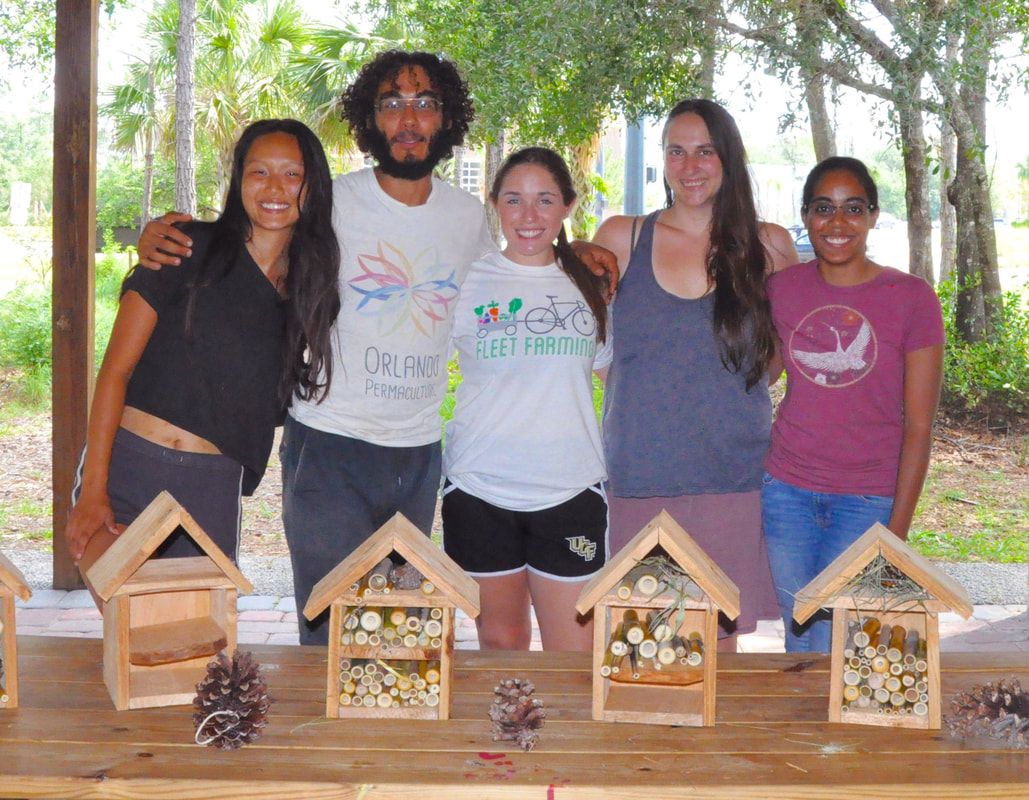National Pollinator Week (always the third full week of June) is an especially opportune time for raising pollinator awareness. This year Bee Campus USA teamed up with the University of Connecticut-Storrs, Portland Community College and UNC Asheville to present a webinar explaining the Bee Campus USA commitments and application process to the members of the Association for the Advancement of Sustainability in Higher Education (AASHE). The recording is available on You Tube or at
AASHE’s Campus Sustainability Hub.
Bee City USA and Bee Campus USA affiliates have been supplying regular updates on how they are mobilizing their communities to reverse pollinator decline during Pollinator Week. They offered entertaining and educational activities for all ages and invited any willing organizations to host events to achieve Bee City USA’s mission of “galvanizing communities to sustain pollinators.” Here are a few “postcards.”
Salisbury, Maryland
In Salisbury, Maryland, the Salisbury Zoo took the lead for the Week and welcomed over 1159 visitors on June 23. Three beekeepers presented that day and the Cooperative Extension office and Master Gardeners led a pollinator craft. Bees weren’t the only pollinators being celebrated at the Salisbury Zoo. Visitors were able to learn about a new conservation and research partnership between the Zoo, Salisbury University, and Maryland Department of Natural Resources geared towards saving the
frosted elfin, a native butterfly species listed as endangered by several states, but not federally listed. Children created houses for cavity nesting bees out of tin cans and bamboo; and donned wings and posed for pollinator selfies. (See photo above) Guests received literature on how to make their yard pollinator friendly. The Zoo had a mini vegetable garden display talking about pollination and the Herb Society led a tour about pollinators and herbs. There were lots of posts on the Zoo’s social media about National Pollinator Week and how links to other interesting sites on bee-friendly gardening and facts about bees. They decided the bee dance exhibit needs music and a leader to get it going!
Denton, Texas
Denton, Texas, partnered with local libraries, the Denton County Beekeepers Association, a Master Naturalist from the Elm Fork Trinity, and the Painted Flower Farm (local native nursery) to offer a variety of events throughout the week. SCRAP Denton, a local creative reuse store and donation center, offered hands-on crafts with flower, butterfly, and bee themes for children. The library hosted a special pollinator-themed Story Time and sang songs about bees and butterflies. followed by planting in the Pollinator Garden. Clear Creek Natural Heritage Center hosted a class for children, presented by the Denton County Beekeepers Association, about the life of the honey bees, pollination, and how important pollinators are to the environment.
Decatur, Georgia
“Beecatur” held a total of 10 events during the week including a Native Plants Talk & Sale, a Pollinator Portraits photography exhibition, a pollinator photo safari, a pollinator puppet-making and storytelling for kids, and a screening of
The Guardians at Agnes Scott College. This newly released film led to a lively conversation about Monarchs, and pollinators generally.
Gillette, Wyoming
Gillette engaged Farmers Market visitors in conversation about pollinators and food, and hosted a Pollinator Count at the Urban Orchard, and planted milkweed.
Talent, Oregon
Talent not only dedicated their new City Hall pollinator garden, they also re-certified several local pollinator gardens and added couple of new ones.
Mountain Home, Idaho
Mountain Home’s Farmer’s Market went right to the stomach to make friends for pollinators! They hosted Pollinator Appreciation Day on June 23 complete with free chicken and shrimp BBQ glazed in honey & garlic and honey dressed salads courtesy of the University of Idaho Extension-Elmore County. Enticing Market visitors with honey, Extension volunteers in bee costumes talked to them about beekeeping and shared an entomology box with pinned native bees.
Surry Community College, Dobson, NC
Surry Community College got a jump on National Pollinator Week in the spring! They hosted Buzz Fest, an official event of the 2018 North Carolina Science Festival presented by the Biogen Foundation, a month-long effort to celebrate hands-on science activities. F
ree and open to the public, Buzz Fest engaged college classes, the community, home school groups, and local school systems. Led by SCC Biology Instructor Grayson Patton and facilitated by students in Environmental Science, Horticulture, and Botany classes, the Bio Blitz was a scavenger hunt-like activity focused on finding and documenting local insect pollinators and their associated host plants. Participants explored vast natural areas surrounding campus to collect images of insects and plants which were later uploaded to the event group page
and identified using the iNaturalist smartphone app. Amy Moyle spoke on “Technology & Beekeeping” and
Debbie Roos lectured on “Pollinator Gardening.”
Asheville, NC
Local facilitator, Asheville GreenWorks, invited organizations and businesses across the Asheville area to host Pollination Celebration! events throughout the month of June, resulting in more than fifteen events for young and old. The photo above shows a stop on the pollinator-focused garden tour at Bee Campus USA-UNC-Asheville.
Seattle, WA
Working in conjunction with more than 20 local organizations, Bee City USA-Seattle hosted a variety of events, kicking off with a Bee Photo Exhibit at Central Co-op, by biologist and wild-pollinator photographer, Will Peterman. Central Co-op also installed educational markers on various
pollinator dependent items in the grocery store and
hosted a screening of The Guardians when a butterfly expert talked about the difference between the monarchs in the movie and the monarchs on the west coast, as well as how the two groups interact.
At the “Meet the Bees” party, The Common Acre celebrated the release of the first EVER Field Guide to Bees of Puget Sound. Along with live music, actors portraying bees, and tasty treats, key scientists involved with the guide made presentations. The Common Acre joined forces with the Tilth Alliance to offer multiple opportunities to participate in a field day and work parties in local parks, farms, and pollinator patches, as well as workshops on pollinator friendly gardening. Community members learned how to make insect hotels, planted native plants, and met with Washington State University (WSU) researchers and other pollinator experts to learn about tools for identifying, conserving, and promoting wild pollinators. The Garden Hotline worked on the pollinator garden for the Rainier Beach Urban Farm and Wetlands, featuring useful weeds, medicinal, native, and ornamental plants, all of which are great for a variety of pollinators. Based on WSU research. special focus was given to selection of plants, and the bee species present and how to provide for them.
Midweek, a Save Pollinators Symposium featured lightning talks from diverse perspectives including the Washington state Poet Laureate, urban farmers, educators and others.
University of Central Florida, Orlando, FL
UCF hosted a tour of their pollinator garden followed by a bee condo making workshop. Attendees left with their own bee condos and pamphlets to enable them to identify local pollinators and flowers in the future.
Durham, NC
Durham, NC, launched National Pollinator Week with the Bee Bash at The Durham Hotel to educate about pollinators, habitat, bees, bee products and honey! Bee Downtown started the Bee Bash three years ago. Exhibitors were Keep Durham Beautiful, Durham Bee City USA, Honeygirl Meadery, Durham County Beekeepers Association, The Durham Originals and Granville County Beekeepers. Among Durham’s many Pollinator Week events were the Burt’s Bees Cabin tours, Pollinator Day at the Museum of Life and Science, and the Bee Jubilee in Granville County.
